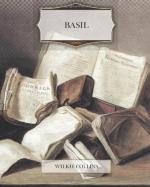The chilling calmness of his tones, the question itself, and the time at which he put it, the unnatural repression of a single word of rebuke, of passion, or of sorrow, after such a confession as I had just made, struck me speechless. He turned a little away from the bookcase—still keeping his hand on the book inside—and repeated the question. His eyes, when they met mine, had a pining, weary look, as if they had been long condemned to rest on woeful and revolting objects; his expression had lost its natural refinement, its gentleness of repose, and had assumed a hard, lowering calmness, under which his whole countenance appeared to have shrunk and changed—years of old age seemed to have fallen on it, since I had spoken the last fatal words!
“Have you anything more to say to me?”
On the repetition of that terrible question, I sank down in the chair at my side, and hid my face in my hands. Unconscious how I spoke, or why I spoke; with no hope in myself, or in him; with no motive but to invite and bear the whole penalty of my disgrace, I now disclosed the miserable story of my marriage, and of all that followed it. I remember nothing of the words I used—–nothing of what I urged in my own defence. The sense of bewilderment and oppression grew heavier and heavier on my brain; I spoke more and more rapidly, confusedly, unconsciously, until I was again silenced and recalled to myself by the sound of my father’s voice. I believe I had arrived at the last, worst part of my confession, when he interrupted me.
“Spare me any more details,” he said, bitterly, “you have humiliated me sufficiently—you have spoken enough.”
He removed the book on which his hand had hitherto rested from the case behind him, and advanced with it to the table—paused for a moment, pale and silent—then slowly opened it at the first page, and resumed his chair.
I recognised the book instantly. It was a biographical history of his family, from the time of his earliest ancestors down to the date of the births of his own children. The thick quarto pages were beautifully illuminated in the manner of the ancient manuscripts; and the narrative, in written characters, had been produced under his own inspection. This book had cost him years of research and perseverance. The births and deaths, the marriages and possessions, the battle achievements and private feuds of the old Norman barons from whom he traced his descent, were all enrolled in regular order on every leaf—headed, sometimes merely by representations of the Knight’s favourite weapon; sometimes by copies of the Baron’s effigy on his tombstone in a foreign land. As the history advanced to later dates, beautiful miniature portraits were inlaid at the top of each leaf; and the illuminations were so managed as to symbolize the remarkable merits or the peculiar tastes of the subject of each biography. Thus, the page devoted to my mother was surrounded by her favourite violets, clustering thickest round the last melancholy lines of writing which told the story of her death.




